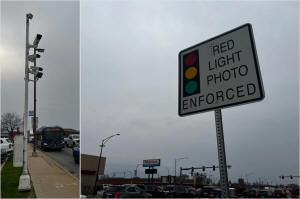Jury deadlocks, mistrial declared in federal bribery case of Sen. Emil
Jones III
[April 25, 2025]
By Hannah Meisel
A federal judge on Thursday declared a mistrial in the case of state
Sen. Emil Jones III, D-Chicago, after a jury deadlocked in their
deliberations over whether Jones agreed to take bribes from red-light
camera entrepreneur-turned-government cooperator Omar Maani in 2019,
then lied to the FBI about it.
The senator, who’s served 16 years in Springfield since he replaced his
father — former Illinois Senate President Emil Jones Jr. — was charged
with three counts of bribery and lying to the FBI. Before they began
deliberating Monday, jurors heard eight days of arguments, evidence and
testimony, including from Jones himself.
The jury sent an initial note indicating they were at a stalemate on two
of the counts late Wednesday, which was met with a legally required
instruction from the judge encouraging further deliberations Thursday
morning. But nearly 23 hours into deliberations early Thursday
afternoon, the jury sent another note telling the judge they’d
deadlocked on all three counts.
“The jury cannot come to a unanimous verdict on all three counts,” the
note read. “No one is willing to surrender their honest beliefs.”
After polling individual members of the jury while white noise blasted
through the courtroom’s speakers, U.S. District Judge Andrea Wood said
the majority of jurors believed further deliberations would be unlikely
to change anything.
The judge then declared a mistrial over the objections of Jones’
attorneys, who wanted the jury to keep deliberating.
“The lack of unanimity in jury room is evidence the government has not
met its burden beyond a reasonable doubt,” Jones attorney Joshua Adams
told the judge.
But the judge said case law did not support forcing the jury to keep
deliberating for that reason and cited the number of hours it had spent
in the jury room and the complexity of the case as weighing in favor of
a mistrial, which prosecutors supported. She then set the next hearing
in the case for June 10.
Jones’ face was placid as Judge Wood went through her rationale to
declare a mistrial. While he had several family members present for each
day of trial, the courtroom gallery was filled mostly with members of
the media.
On his way out of the courtroom, Jones remarked that now he’d have to
“go back to work.”
Flanked by his attorneys, Jones gave a brief statement before leaving
the Dirksen Federal Courthouse with his stepmother Thursday evening.
“I want to thank the judge, thank the jury, thank the prosecution and
most importantly, thank my lawyers,” he said. “I look forward to another
fight.”

Jones’ father, the former Senate president, attended most days of trial,
listening as his son was accused of benefitting from nepotism and he was
accused of having practicing politics that included accepting personal
favors.
It’s the third high-profile federal public corruption trial in seven
months to end in a hung jury. In February, jurors deliberating former
Illinois House Speaker Michael Madigan’s case deadlocked on six of the
23 counts while convicting him on 10 and acquitting on seven. And in
September, a judge had to declare a mistrial after jurors deadlocked on
all five counts alleging the former president of AT&T Illinois bribed
Madigan in 2017.
In closing arguments Monday, Jones’ attorney Vic Henderson accused the
feds of employing the “Dirksen two-step,” referring to the Dirksen
Federal Courthouse where a parade of elected officials have either gone
to trial or pleaded guilty over the years. He asked jurors to set aside
any bias they might have against Chicago politicians given the “long
history” of corruption cases brought to the courthouse.
“It has happened time and time and time again in this building,”
Henderson said. “So when yet another government official comes here and
is charged, there’s this feeling, ‘Here we go again.’ … But judge asked
each and every one of you if you can be fair.”

Jones last week made the risky decision to testify in his own defense.
The last time a sitting state official took the witness stand in their
own corruption trial was 20 years ago, when then-state Rep. Patricia
Bailey testified in a bench trial before being convicted on election
fraud and forgery charges.
During their closing arguments Monday, prosecutors poked holes in Jones’
claims both on the witness stand and to the FBI during a Sept. 24, 2019,
interview at his home that Maani made him uncomfortable. Jones last week
told the jury that he was trying to avoid taking money from Maani,
saying he gave off the vibe of a “used car salesman” and that he was
aware Maani was trying to bribe him.
As the pair dined at Jones’ favorite Chicago steakhouse on July 17,
2019, Maani pushed Jones to give him a number for a campaign
contribution. After demurring, Jones finally came up with a figure:
$5,000.
“If you can raise me five grand, that’d be good,” Jones said after Maani
pushed him to come up with a number. “But most importantly, I have an
intern working in my office and I’m trying to find him another job,
another part-time job while he’s in school. … Do you all have any
positions available?”
In closing arguments, Henderson said at that point in the dinner, the
senator still believed Maani was trying to participate in a “legitimate
fundraiser,” and was just trying to make good on a promise he made to
help his former intern find a part-time job.
But Assistant U.S. Attorney Prashant Kolluri said the fact that Jones
was still willing to move forward with Maani even after the FBI
cooperator hinted that the contribution and job would be part of a bribe
indicate that Jones had no objections — despite his testimony six years
later.
Kolluri showed the jury an email Jones sent to Maani the week after
their July 2019 meeting.
“Had a great time at dinner last week, looking forward to the many more
good times my friend,” Jones wrote in his July 24, 2019, email to Maani
that contained his former intern’s resume.
“Is that a person who feels uncomfortable around Omar Maani?” Kolluri
asked the jury. “Is that evidence of a person who doesn’t want to accept
a bribe? No. This is evidence of someone who knows and is a willing
participant in this process.”
Road to trial
Even without testifying in his own defense, Jones is also an anomaly as
the only sitting state official in more than a decade to take his case
to trial; in 2014, then-state Rep. Derrick Smith was convicted on
bribery charges. And while not a state official, former Chicago Alderman
Patrick Daley Thompson went to trial while still a member of the City
Council and resigned the same day of his conviction in 2022.
But the feds’ wide-ranging public corruption probe first made public in
2018 has mostly resulted in elected officials either resigning or
pleading guilty after being hit with charges.

Jones, however, told the jury last week that he decided to fight his
charges even before they were filed. During a September 2021 meeting at
federal offices downtown, the senator and his then-attorney watched the
hours of secretly recorded meetings with Maani and the September 2019
FBI interview.
Jones claimed to the jury that after seeing the tapes in full, he
concluded the feds “tried to twist what I was saying” when he was
initially shown “snippets” of the recordings in February 2020 after his
attorney received a letter that charges were imminent.
When charges finally came down in September 2022, Jones declined to
resign, despite pressure from Senate leadership and even Gov. JB
Pritzker. He won another four-year term to the Illinois Senate in
November of that year, although the senator has remained barred from his
previous leadership roles, including chairing a committee.
In addition to Jones’ surprise testimony, the jury also heard from Maani,
whose own bribery charge was dismissed in 2023 in fulfillment of his
deferred prosecution agreement. While on the witness stand, Maani
acknowledged having paid bribes for nearly his entire career, which
continued with the FBI’s blessing and assistance after he began
cooperating with the feds in January 2018.

[to top of second column]
|

FBI cooperating witness Omar Maani was a co-owner of SafeSpeed,
which operated red-light camera systems in Chicago’s southwest
suburbs, including at the intersection of Archer and Harlem avenues
in Summit. Maani was worried that state Sen. Emil Jones III’s
repeated legislative proposals for a statewide study on red-light
cameras was a “prelude to a ban.”

Maani’s cooperation led to guilty pleas from a handful of public
officials involved with Maani and his businesses, including then-Sen.
Martin Sandoval, D-Chicago, who received $75,000 in cash from Maani,
never knowing the cash was provided by the FBI. At a dinner between the
three in late June 2019, Sandoval hinted at benefits he received from
Maani and told Jones that Maani “wants to be your friend.”
Maani testified that he worried Jones’ proposed legislation calling for
a statewide study of red-light cameras would be a “prelude to a ban,”
which would decimate his industry. Jones had refiled similar legislation
for several years in a row, but the only time it got close to becoming
law was in 2017 when the scope of the study was negotiated down to just
the city of Chicago.
Since Maani’s company SafeSpeed operated only in the Chicago suburbs,
Maani wanted Jones to limit his 2019 legislation in the same way.
After Maani agreed to both Jones’ $5,000 suggestion and the job request
for his former intern at their July 2019 dinner, the senator then asked
Maani, “What can I do about Chicago?”
According to the feds, that was the moment Jones agreed to the bribe.
Job for former intern
Prosecutors also called two FBI agents who worked on the case, as well
as Jones’ former intern, Christopher Katz. In the summer of 2019, Katz
had just received his associate’s degree and was about to start an
architecture program at the Illinois Institute of Technology. Katz told
the jury he needed “some money coming in” to help pay for school and was
seeking Jones’ assistance to get a part-time job.
Jones testified that he’d asked Maani for help because he’d seen dozens
of college students working at SafeSpeed when he was invited to tour the
company’s offices in April 2019. Though Maani initially said Katz could
work as a “reviewer” of red-light camera footage, by his next meeting
with Jones a few weeks later, Maani told Jones he was reticent about
having SafeSpeed hire Katz.
“It looks really goofy and concerning that we’re now hiring his intern
with someone who’s sponsoring negative legislation against us,” Maani
testified earlier this month.
Instead, Maani floated the idea of hiring Katz to work for him directly
on a research project. And a few days later, Maani called Jones to tell
him that he planned to put Katz “on my payroll” even though he didn’t
have much work for him to do at the time.
“I just wanted to make sure that he’s the type of kid that, you know,
when he gets a check and he’s not doing anything right away, that he’s,
you know, he’s not gonna be spooked by that,” Maani said on an Aug. 12,
2019, wiretapped call. “He’s not gonna be weird and stuff. … Is he —
would he be cool with that for a while? I mean, does he get it? Does he
understand this?”
“Yeah, but um, make sure we find him some work,” Jones replied.
Katz ended up receiving a total of $1,800 in weekly payments from Maani
over the course of six weeks until the feds’ investigation — and Maani’s
role in it — was made public on Sept. 24, 2019.
“The defendant knew this was not a normal job,” Assistant U.S. Attorney
Tiffany Ardam said Monday, pointing out Jones had told Katz he “got the
job” in mid-July even before he’d sent Katz’s resume to Maani. “What
that means is the defendant knew this was part of the bribe.”
A ‘quiet’ campaign contribution
In addition to being cautious about hiring Katz at SafeSpeed, Maani also
told Jones he needed to “conceal” any campaign contribution he might
make, telling the senator he was wary about his colleagues growing
suspicious or generating a story for the news media.
At their third and final dinner on Aug. 8, 2019, Maani asked Jones how
he could contribute to the senator’s campaign without it having to be
reported on public campaign finance records.
Jones suggested that Maani could help sponsor a job fair in his
district, mentioning sponsors often pay for food or giveaways at the
events. Jones explained during his testimony that in-kind contributions
like those under $150 don’t need to be reported, and claimed he was
thinking that Maani would pay for some boxes of pizza or a case of
bottled water, though he didn’t mention the $150 threshold during their
dinner conversation.
“Okay, and there’s enough stuff for me to cover for five grand?” Maani
asked?
“You don’t necessarily have to — ” Jones began to answer before Maani
cut him off, telling the senator he didn’t care how it was done, so long
as “everything’s kinda quiet.”
After again telling Maani that event sponsors usually just paid for
food, Jones again turned the conversation to his former intern.

“I’m not really worried so much with you helping me,” Jones said. “Just
help Chris out.”
Jones’ attorney Henderson on Monday pointed to that moment in closing
arguments as proof Jones was attempting to dissuade Maani from giving
him any money. Henderson reiterated that Jones never brought up the
contribution after it dawned on him that Maani was trying to bribe him.
“Why would somebody on the take say don’t give me any money?” Henderson
asked. “Why would somebody who doesn’t know their calls are being
listened to say, ‘don’t give me any money?’ Why? Because he’s not on the
take.”
But Ardam said Maani’s references to wanting to “conceal” the
contribution were “giant red flags.”
“The defendant knew this was a bribe,” Ardam said Monday. “A bribe is a
crime, and crimes need to be hidden.”
Alleged lies to FBI
But when a pair of FBI agents knocked on Jones’ door the morning of
Sept. 24, 2019, Jones denied having discussed with Maani how a campaign
contribution could be made without having it publicly reported.
That was one of three specific lies the feds allege the senator told
during the interview, which was secretly recorded. The agents told Jones
they were investigating Sandoval, who later died after pleading guilty,
but did not reveal they were also investigating Jones.
When Special Agent Timothy O’Brien asked whether he and Maani came up
with an amount Maani was going to donate, Jones said, “no, no no.”
Kolluri on Monday told the jury that Jones’ response to that question
“was intentional.”
“He knew he’d broken the law,” the prosecutor said. “You’ve heard the
recording of that interview and you know he was not truthful.”
In the interview, Jones also denied knowing that Katz was getting paid,
despite he and Maani agreeing that $15 an hour was fair at their last
dinner six weeks prior.
The feds also say Jones lied about his promise to “protect” Maani and
SafeSpeed from then-state Rep. David McSweeney, R-Barrington Hills, a
friend of Jones’ who was also in favor of legislation to study red-light
cameras but only because he wanted to see the industry abolished in
Illinois.
Kolluri on Monday told the jury the FBI agents were just two of the
people or circumstances Jones blamed for landing him in court.
“Not once did he take any accountability for any of this or express any
regret,” the prosecutor said. “But most importantly, he lied to you.”
Kolluri said that in addition to lying to the FBI, Jones lied on the
witness stand.
“He had an answer for almost everything, the same thing he said Omar
Maani did,” Kolluri said, hearkening back to Jones’ description of Maani
in testimony last week. “But the problem with lying is it always catches
up to you.”
All contents © copyright 2025 Associated Press. All rights reserved |